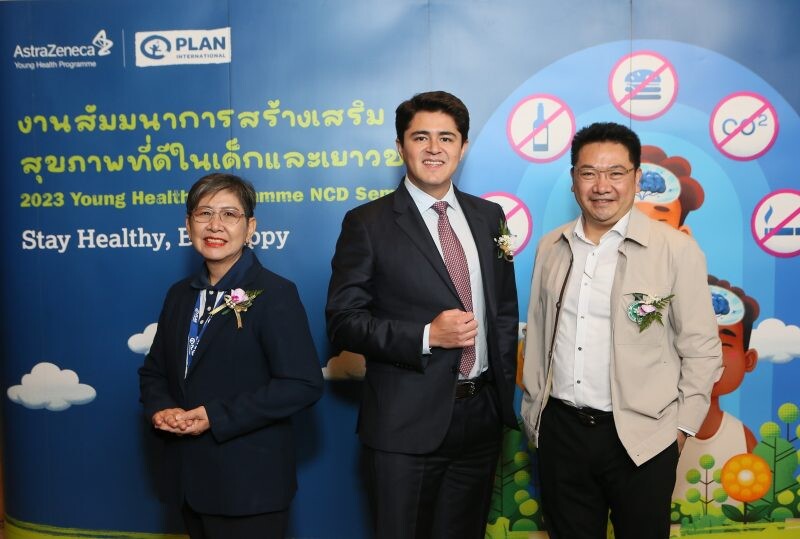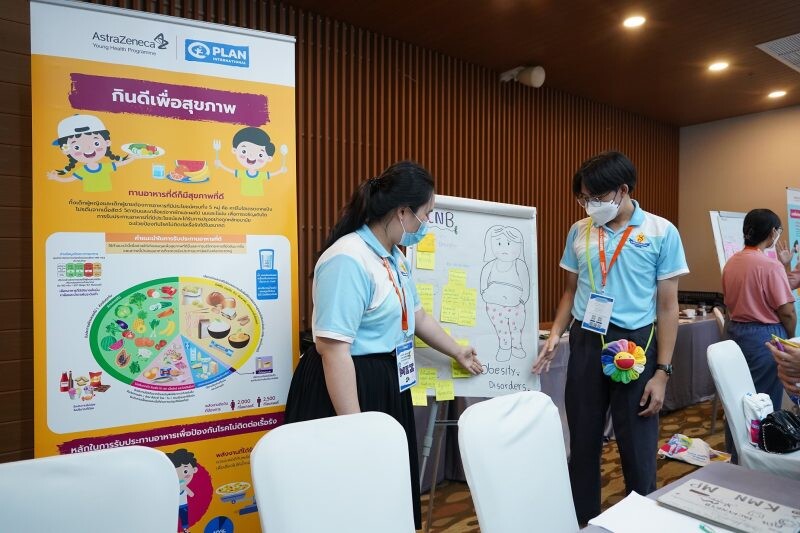AstraZeneca and Plan International Thailand host '2023 Young Health Programme NCD Seminar' Empowering Thai Youths to Prevent Non-Communicable Diseases
AstraZeneca Thailand and Plan International Thailand recently joined forces to organise the '2023 Young Health Programme NCD Seminar' to promote knowledge and understanding of non-communicable diseases (NCDs) among young people with the aim to prevent the most common NCDs. The event presented speakers from leading organisations including Save the Children Thailand, the United Nations International Children's Emergency Fund (UNICEF), the United Nations Development Programme (UNDP), and the Thai Health Promotion Foundation and was held at the Sheraton Grande Sukhumvit Hotel.

According to the United Nations Fund for Population Activities (UNFPA) data as of 2023, 17 percent of the Thai population are young people aged 10-24. According to the World Health Organization (WHO), the probability of premature mortality from NCDs in Thailand is as high as 14 percent. Various agencies thus recognise that youths deserve special attention and should be provided with important information regarding their health. Presently, 15 percent of young people aged 13-15 in Thailand use tobacco, 77.5 percent of young people aged 11-17 engage in insufficient physical activity, and 10 percent of young people aged 10-19 are obese. Among adults aged 18 and above, 25 percent do not meet the recommended levels of physical activity, 11 percent are obese, 25 percent have high blood pressure, and 10 percent have high blood glucose.
The 2022 annual report of the Non-Communicable Diseases Division, the Disease Control Department, the Ministry of Public Health also showed most Thais have misconceptions about diabetes, heart diseases, and salt/sodium consumption, leading to a higher risk of NCDs. Therefore, the promotion of knowledge and understanding about these causes, especially among young people, is important and must be done urgently to empower Thais to have knowledge successfully manage their health.
Dr. Rangsima Airawanwat, Country Director of Plan International Thailand, said: "We are an international human rights organisation dedicated to empowering and educating adolescents to ensure their inclusion and equitable access to their rights. Since July 2019, we have worked with AstraZeneca Thailand under a five-year framework to implement the Young Health Programme Thailand with the aim of equipping young people aged 10 to 24 with health information so that they can prevent NCDs and other health problems. Throughout the programme, we have carried out various activities, including training young leaders who will drive health policies. We have also conducted monthly campaigns to impart knowledge during important awareness health days, training for public health officials to provide youth-friendly health services and held seminars on NCD prevention. Since the start of programme implementation, the YHP has reached more than 652 young health leaders from 32 schools and 10 universities. These leaders have spread knowledge in peer-to-peer formats to more than 86,000 youths and via media to over 7.7 million community members in the society".
"AstraZeneca Thailand supports Plan International Thailand with the Young Health Program as a community investment initiative by continuously providing advice on how to avoid high-risk behaviours, which lead to NCD. The Young Health Programme contributes to the pursuit of the UN Sustainable Development Goal 3.4, which is about reducing premature mortality from NCDs by one-third by 2030. AstraZeneca focuses on advancing healthcare and promoting wellbeing in society because we believe that a sustainable future is rooted in healthy people, society, and the planet," Roman Ramos, Country President, AstraZeneca Thailand Ltd., said.
Young people from the programme have joined the '2023 Young Health Programme NCD Seminar' as Young Health Programme Youth Ambassadors. They presented recommendations to drive and change Thailand's health promotion policies from the perspective of young people, especially with regards to the prevention of unhealthy behaviours, to prevent risks of NCD. Speaking on behalf of the new generation, they also addressed other relevant factors such as reproductive health and related rights, gender equality, and emotional well-being. At the seminar, the Young Health Programme Youth Ambassadors presented their information from the data collection based on adolescent's health-related behaviours, such as, mental health issues, exposure to air pollution, and the lack of adequate physical activity. These risk behaviours can be improved through enhancing health literacy for healthy habits.
The '2023 Young Health Programme NCD Seminar' also featured speakers from government agencies, the United Nations, and civil-society organisations namely the Non-Communicable Diseases Division of the Ministry of Public Health's Disease Control Department, the Child and Adolescent Mental Health Rajanagarindra Institute, the Bangkok Metropolitan Administration's Health Department, the United Nations International Children's Emergency Fund (UNICEF), the United Nations Development Programme (UNDP), and Save the Children (Thailand) Foundation. The panellists discussed risks faced by young people that contribute to NCDs in the future as well as their organisation's drive to promote good health and proactively develop youth-friendly health services that integrate their work in a systematic manner.
For more information on the Young Health Programme, please visit www.yhp.astrazeneca.com

ติดต่อเราได้ที่ facebook.com/newswit